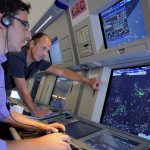On the heels of a momentum-filled few days at the Munich Satellite Navigation Summit (March 5-7), comes more big news from the European Union’s Global Navigation Satellite Systems Agency (GSA) and Galileo.
The GSA announced on Thursday that it has officially launched the EDG²E project (Equipment for dual frequency Galileo GPS and EGNOS) with a consortium led by Thales and the GSA.
This four-year project intends to develop a dual-frequency multi-constellation receiver, enabling enhanced navigation capabilities, support standardization and certification preparation. The consortium includes Thales, Thales Alenia Space and ATR, as well as contributions from Dassault Aviation and the French Civil Aviation Authority (DGAC).
The GNSS receiver is the cornerstone of aircraft navigation systems. The system processes signals from satellite constellations and the Space Based Augmentation System (SBAS) to accurately determine aircraft position, altitude and velocity. The prototype receiver developed under the auspices of the EDG²E project will use signals from the United States’ GPS and the European Galileo positioning systems, as well as from SBAS multi-constellation EGNOS. The project aims to achieve a prototype demonstration by 2021, according to Thales. The prototype receiver performance will be evaluated during a flight test campaign performed by ATR using one of the company’s test aircraft.

Initiated by the GSA, the EDG²E project will support the launch of the Galileo satellite constellation. At this week’s satellite conference in Munich, Galileo’s progress and evolving applications was a prominent part of many of the sessions.
“Leading the EDG²E project puts Thales at the forefront of the next generation receivers which will equip future aircraft by 2025, designed to make navigation more precise and thus safer, unleashing the potential for increased air traffic,” said Philippe Benquet, vice president, R&T for Flight Avionics, Thales
EGNOS has been certified for use in aviation since February 2011 and is an effective system to complement GPS in order to provide better levels of performance, consequently enhancing aircraft approach capabilities. The next generation of EGNOS, called EGNOS V3, will further enhance performance by complementing both the Galileo and GPS satellite navigation constellations.
“EGNOS v3 will provide aviation users with an increased quality of services, better accuracy and extended coverage area among other key performance indicators. Fundamental Element Programme is a medium that supports development of terminals and antennae fostering use of E-GNSS in all domains. In this perspective, EDG2E is an important step for GSA as it will contribute to availability of high technology products on the aviation market, taking benefit of dual frequency multi constellation features offered by EGNOS v3,” said Jean-Marc Pieplu, GSA Head of EGNOS Services Program.
At the end of the EDG²E project, a new standard for GPS Galileo and SBAS aviation receivers will be completed, and the first SBAS dual-frequency GPS Galileo receivers for aviation will be ready for final development and provide safer operations not only for the aviation sector but also for other safety-critical applications.
Pieplu, from Prague, Czech Republic, was a panelist on Tuesday morning’s Munich Satellite Navigation Summit session titled, “GNSS Program Updates – Global, Regional and Augmentation Systems.” The panel was chaired by John Betz, Fellow, The MITRE Corporation (Bedford, Mass., USA) and included representatives from the U.S.’s GPS, Russia’s GLONASS, China’s BeiDou, and Japan’s Quasi-Zenith Satellite System (QZSS), as well as Europe’s Galileo system. Paul Flament, Head of Unit, Galileo and EGNOS, Program Management, European Commission, provided a status update on Galileo along with recent achievements. An update on the International Committee on GNSS (ICG) was delivered by Sharafat Gadimova, Program Officer, UN Office for Outer Space Affairs, Vienna, Austria.






